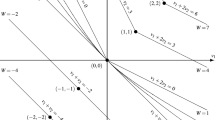Abstract
In the presence of Pareto, non-dictatorship, full domain, and transitivity, an extremely weak independence condition disallows both anonymity and neutrality.
Similar content being viewed by others
References
Arrow KJ (1963) Social choice and individual values, 2nd edn. Wiley, New York
Aswal N, Chatterji S, Sen A (2003) Dictatorial eomains. Econ Theory 22:45–62
Black D (1958) The theory of committees and elections. Cambridge University Press, London
Borda J-C (1781) Mémoire sur les Élections au Scrutin. Histoire de l’Académie Royale des Sciences
Bordes GA, Le Breton M (1990) Arrovian theorems for economic domains: the case where there are simultaneously private and public goods. Soc Choice Welf 7:1–17
Campbell DE, Fishburn PC (1980) Anonymity conditions in social choice theory. Theory Decis 12:21–39
Campbell DE, Kelly JS (2000) Information and preference aggregation. Soc Choice Welf 17:3–24
Campbell DE, Kelly JS (2002) In: Arrow KJ, Sen AK, Suzumura K (eds) Impossibility theorems in the arrovian framework handbook of social choice and welfare. North-Holland, Amsterdam, pp. 35–94
Campbell DE, Kelly JS (2004a) Pareto, anonymity, and neutrality, but not IIA: the countable case
Campbell DE, Kelly JS (2004b) Pareto, anonymity, independence, and neutrality: four alternatives
Coughlin PJ (1979/80) A direct characterization of Black’s first borda count. Econ Lett 4:131–133
Debord B (1992) An axiomatic characterization of Borda’s k-choice function. Soc Choice Welf 9:337–343
De Grazia A (1953) Mathematical derivation of an electoral system. Isis 44:42–51
Fishburn PC (1969) Preferences, summation and social welfare functions. Manage Sci 16:179–186
Fishburn PC (1973) The theory of social choice. Princeton University Press, Princeton
Fishburn PC (1987) Interprofile conditions and impossibility. Harwood Academic Publishers, Chur
Goodman LA, Markowitz H (1952) Social welfare functions based on individual rankings. Am J Sociol 58:257–262
Graver J (2004) A note on natural correspondences that satisfy exclusion
Hansson B, Sahlquist H (1976) A proof technique for social choice with variable electorate. J Econ Theory 13:193–200
Kelly JS (1994) The Bordes-Le Breton exceptional case. Soc Choice Welf 11:273–281
Luce RD, Raiffa H (1957) Games and decisions. Wiley, New York
Nitzan SI, Rubinstein A (1981) A further characterization of Borda ranking method. Public Choice 36:153–158
Rae DW, Schickler E (1997) Majority rule. In: Mueller DC (ed) Perspectives on public choice. Cambridge University Press, Cambridge, pp. 163–180
Sen AK (1970) Collective choice and social welfare. Holden Day, San Francisco
Young HP (1974) An axiomatization of Borda’s rule. J Econ Theory 9:43–52
Wilson RB (1972) Social choice without the Pareto principle. J Econ Theory 5:478–486
Author information
Authors and Affiliations
Corresponding author
Rights and permissions
About this article
Cite this article
Campbell, D.E., Kelly, J.S. Social welfare functions that satisfy Pareto, anonymity, and neutrality, but not independence of irrelevant alternatives. Soc Choice Welfare 29, 69–82 (2007). https://doi.org/10.1007/s00355-006-0193-0
Received:
Accepted:
Published:
Issue Date:
DOI: https://doi.org/10.1007/s00355-006-0193-0



